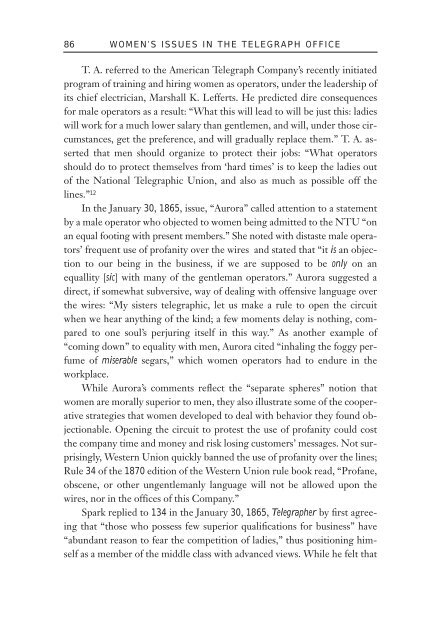My Sisters Telegraphic: Women in the Telegraph Office ... - Monoskop
My Sisters Telegraphic: Women in the Telegraph Office ... - Monoskop
My Sisters Telegraphic: Women in the Telegraph Office ... - Monoskop
Create successful ePaper yourself
Turn your PDF publications into a flip-book with our unique Google optimized e-Paper software.
86<br />
WOMEN’S ISSUES IN THE TELEGRAPH OFFICE<br />
T. A. referred to <strong>the</strong> American <strong>Telegraph</strong> Company’s recently <strong>in</strong>itiated<br />
program of tra<strong>in</strong><strong>in</strong>g and hir<strong>in</strong>g women as operators, under <strong>the</strong> leadership of<br />
its chief electrician, Marshall K. Lefferts. He predicted dire consequences<br />
for male operators as a result: “What this will lead to will be just this: ladies<br />
will work for a much lower salary than gentlemen, and will, under those circumstances,<br />
get <strong>the</strong> preference, and will gradually replace <strong>the</strong>m.” T. A. asserted<br />
that men should organize to protect <strong>the</strong>ir jobs: “What operators<br />
should do to protect <strong>the</strong>mselves from ‘hard times’ is to keep <strong>the</strong> ladies out<br />
of <strong>the</strong> National <strong><strong>Telegraph</strong>ic</strong> Union, and also as much as possible off <strong>the</strong><br />
l<strong>in</strong>es.” 12<br />
In <strong>the</strong> January 30, 1865, issue, “Aurora” called attention to a statement<br />
by a male operator who objected to women be<strong>in</strong>g admitted to <strong>the</strong> NTU “on<br />
an equal foot<strong>in</strong>g with present members.” She noted with distaste male operators’<br />
frequent use of profanity over <strong>the</strong> wires and stated that “it is an objection<br />
to our be<strong>in</strong>g <strong>in</strong> <strong>the</strong> bus<strong>in</strong>ess, if we are supposed to be only on an<br />
equallity [sic] with many of <strong>the</strong> gentleman operators.” Aurora suggested a<br />
direct, if somewhat subversive, way of deal<strong>in</strong>g with offensive language over<br />
<strong>the</strong> wires: “<strong>My</strong> sisters telegraphic, let us make a rule to open <strong>the</strong> circuit<br />
when we hear anyth<strong>in</strong>g of <strong>the</strong> k<strong>in</strong>d; a few moments delay is noth<strong>in</strong>g, compared<br />
to one soul’s perjur<strong>in</strong>g itself <strong>in</strong> this way.” As ano<strong>the</strong>r example of<br />
“com<strong>in</strong>g down” to equality with men, Aurora cited “<strong>in</strong>hal<strong>in</strong>g <strong>the</strong> foggy perfume<br />
of miserable segars,” which women operators had to endure <strong>in</strong> <strong>the</strong><br />
workplace.<br />
While Aurora’s comments reflect <strong>the</strong> “separate spheres” notion that<br />
women are morally superior to men, <strong>the</strong>y also illustrate some of <strong>the</strong> cooperative<br />
strategies that women developed to deal with behavior <strong>the</strong>y found objectionable.<br />
Open<strong>in</strong>g <strong>the</strong> circuit to protest <strong>the</strong> use of profanity could cost<br />
<strong>the</strong> company time and money and risk los<strong>in</strong>g customers’ messages. Not surpris<strong>in</strong>gly,<br />
Western Union quickly banned <strong>the</strong> use of profanity over <strong>the</strong> l<strong>in</strong>es;<br />
Rule 34 of <strong>the</strong> 1870 edition of <strong>the</strong> Western Union rule book read, “Profane,<br />
obscene, or o<strong>the</strong>r ungentlemanly language will not be allowed upon <strong>the</strong><br />
wires, nor <strong>in</strong> <strong>the</strong> offices of this Company.”<br />
Spark replied to 134 <strong>in</strong> <strong>the</strong> January 30, 1865, <strong>Telegraph</strong>er by first agree<strong>in</strong>g<br />
that “those who possess few superior qualifications for bus<strong>in</strong>ess” have<br />
“abundant reason to fear <strong>the</strong> competition of ladies,” thus position<strong>in</strong>g himself<br />
as a member of <strong>the</strong> middle class with advanced views. While he felt that

















